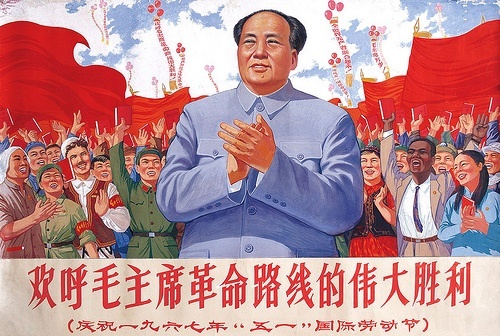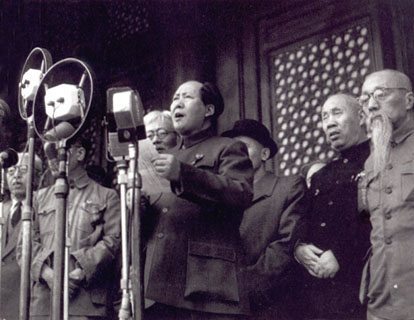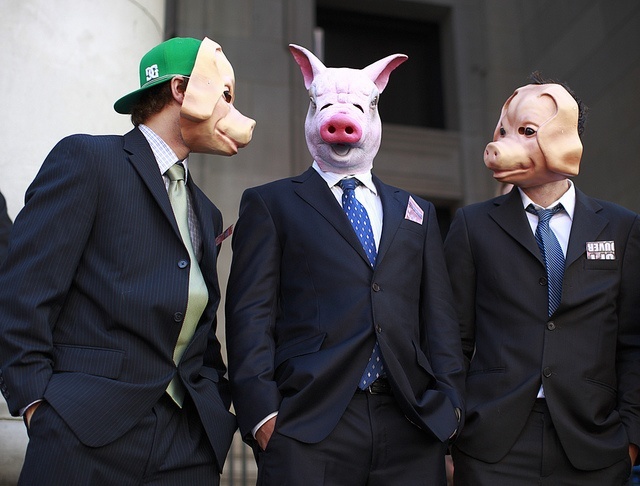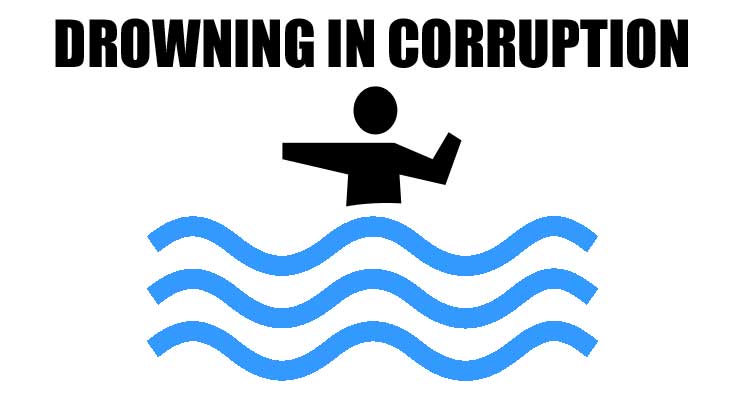A response to the New York Times op-ed “Why China’s Political Model is Superior” by Eric X. Li
Recently the New York Times published an op-ed by Eric X. Li, identified as a venture capitalist that basically argues that democracy is a failed experiment and that the sitting Chinese dictatorship is the model government of the future. You can read Li’s article here. Li’s dismissal of three centuries of democratic philosophy, his inaccurate analysis of the tenets of democracy across the world, and his willingness to disregard the dangerous aspects of the dictatorship in China, make the op-ed feel like it was published by the Chinese Communist Party’s Orwellian propaganda machine instead of the New York Times. The unfortunate thing is how this letter, not written by a official Chinese government representative, was published and promoted in several major newspapers in the United States and how many Americans and other supposedly democratic people have been intrigued by Li’s anti-democracy message.
Li’s critique of democracy has many weaknesses but this article will mainly focus on democratic philosophy and a short summary of the various dangers associated with the world being subject to the whims of a group of unelected, aging and highly secretive men ensconced in an undisclosed location in China. From the massive pollution and environmental degradation in China to pervasive corruption of police and the judiciary, China’s political model is far from superior, but in actuality quite inferior to the challenges to be faced in the 21st century.
On Democracy
One of democracy’s greatest strengths, and a core part of democratic philosophy, is the orderly and public process of leadership selection. For millennium, selection of leadership was a crucially disruptive aspect of every government. Much of world literature is rife with stories of hereditary kings and succession struggles from Shakespeare’s Macbeth to the Five Classics of China credited to Confucius. This same issue that has plagued dictatorships since the beginning of history plagues China.
The current Chinese method for picking their leadership is as opaque as it was in the Soviet Union or even the Russian or Italian mafia. No one has come up with a workable method to choose new leaders when the time comes in a system that is built without democracy. Chinese dynasties throughout history had a solution they relied on called hereditary succession as did the Kings of England and France, as well as the current monarchy in Saudi Arabia.
Li condemns democratic philosophy which he claims has two fundamental miscalculations specifically that “the individual is rational, and the individual is endowed with inalienable rights”. To Li, the non-government affiliated individual is irrational and has no rights that are to be protected. And to Li the leadership, especially in China, is always rational and has the right to do anything it wants. I would guess that “government is at best a necessary evil” is not one of his favorite quotes of Thomas Paine. The absurd claim that China’s leadership should be free to do whatever it wants is the core of Li’s argument.
For Li, it seems the ability of China’s government to steal, kill and torture its people is what makes the country strong. He claims that China’s system is superior because “China’s leaders would not hesitate to curtail freedoms if the conditions and the needs of the nation changed”. He says that China was right to kill thousands of peaceful protesters at Tienanmen Square in 1989 and the government has been justified in its violence because the result has been the economic growth seen since. This logic is of course completely unsupported and is reminiscent of the “ends justify the means” logic that was used by the worst dictators of the 20th century.
With this logic, there is nothing to stop the Chinese government from repeating the Tienanmen deadly suppression if an Arab Spring or a Color revolution protest reappears in China, which is not such an unlikely prospect. There were 180,000 “mass incidents” reported in China in 2010 alone. Will the government jail, torture or kill protesters when it deems it necessary for “stability”? If the Tibetans, Muslims or Christians in China are in the way of the “needs of the nation”, as determined by the Chinese government, can they be eliminated? If the rights of the United States and the democratic world are in the way of the “needs of the nation”, what is to stop the Chinese government from “curtailing” our freedoms? Is this the future of China on the world stage?
Democratic elections take place today in countries inhabited by roughly three-billion people or 43% of the world’s population according to the non-profit organization Freedom House. Li is quick to dismiss the remarkable gains democracy has made in the last century and ignores entirely the Arab Spring and the protest movement in Russia of the last year.
The other large developing countries that are growing out of poverty at incredible speeds, including India, Indonesia and Brazil, are growing as democratic countries, far from ready to toss out their systems of government to model themselves on China. Countries more ethnically and religiously diverse than China have been able to grow enormously without mass repression, disappearances and torture.
There is also the fact that China has virtually no allies unless you include the likes of Russia, Iran or North Korea all of which are adversarial and mutually mistrusting – perhaps for good reason. The rest of China’s neighbors including India, Japan and even Vietnam are frantically seeking arms and alliances to protect themselves from uncertainty concerning China’s military build-up in places like the South China Sea and Taiwan. Myanmar, a country only a year ago believed to be falling inevitably towards the influence of China’s dictatorship, has in the last several months made an astonishing voluntary transition towards democratic elections including releasing opposition leaders and allowing the opposition to run for upcoming elections. It seems the allure of the China model is not catching on in Asia.
China’s Political Model is Capitalism
The great irony of the Communist Party of China, is not in its dictatorship, which is nothing new, it is that it has recreated in China the worst aspects of the capitalist dictatorships that Karl Marx hated so passionately. Unions are so regulated they are in practice forbidden. The worker has no right to press for rights of working conditions including hours, pay or even safety. Those that fight to expose corrupt party-connected factory owners are often jailed or simply made to disappear.
The government-selected managers of China’s massive state-subsidized industries, including finance, are caricatures of the only villain in Marx’s ideology, the ruthless power-corrupt upper class. Also ironic is that the very freedom Marx enjoyed in England where he was able to write his Communist Manifesto against the unchecked capitalist system is now denied to all Chinese intellectuals or ordinary people. If you live in China and search for anything having to do with democracy on the Internet (for example Democracy Chronicles) you will be blocked from visiting the website and very possibly arrested as well.
Li’s criticism of the United States basically regurgitates the worst headlines of the last five years with a total ignorance of the civilized world’s last 220 years of democratic progress. It is not in the United States where the government’s internal stability is threatened – there is a nationwide movement to remove big money from politics and to remove barriers to voting which will succeed in due course. It is in China, where during the last 20 years the poorest of societies has been turned on its head, where there is no protection from corruption, especially at the highest levels, and no protection for anyone other than the country’s leadership and their cronies, on which the fate of the world hangs in the balance.
Xi Jinping, the man apparently tipped to take over as head of the Communist Party and the position of “President” from the supposedly retiring Hu Jintao, recently toured the United States and met with President Obama. Hopefully during his trip we can get more reasonable coverage of the real China and not the rose-tinted coverage the Chinese Communist Party would like us to see.




Chevy Phillips says
Let’s get down to fundamentals – if China is not democratic, is the US? How about the UK?
The US, for example, is run by something along the lines of a financial aristocracy – a plutocracy of sorts – recently “electing” either a Bush or a Clinton (a pattern that is set to continue). The electoral process in that country is an appalling joke, with two parties (which are virtually identical) utterly precluding any genuine choice for voters. The rate of incumbents getting re-elected is incredibly high. There is not even a trace of democracy in this system, contrary too what the ignorant, brainwashed populous may think.
It’s easy to bash a country that you know literally nothing about (like China) while ignoring the extraordinary deficiencies of the supposedly “free and democratic” west, isn’t it? Maybe the west should get its own house in order before patronising others?
90% of the world is sick to death of being lectured, invaded, and murdered (in their millions) by “democracies” like the US and UK. Their days are over (thank god).
Adrian Tawfik says
I disagree with you but I do respect this perspective and I acknowledge that many people in the world do agree with you. I wish I had time to write more but I will just refer you to a great post by Arch Puddington on a Freedom House report where he concludes, “Despite challenges, the report finds that Americans still enjoy one of the highest levels of freedom in the world”. I very much appreciate your comment though. Certainly, the US has many many challenges to having a democracy that is good enough though, much work to be done.